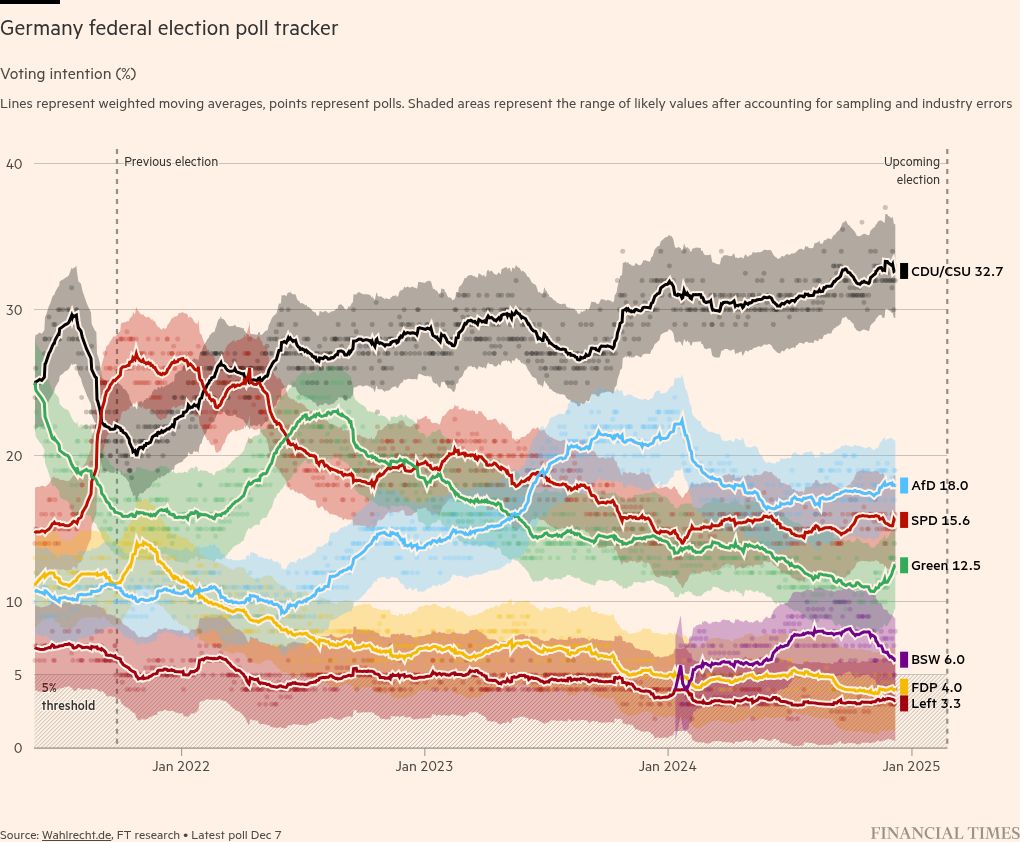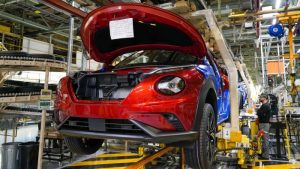German Greens leader cosies up to conservatives

Stay informed with free updates
Simply sign up to the German politics myFT Digest — delivered directly to your inbox.
The leader of the German Greens has advanced the idea of a coalition with the centre-right after next year’s election, arguing the gulf between the two is big but not “insurmountable”.
“Democrats should always be able to overcome their differences — for the good of the country,” Franziska Brantner said in an interview.
A “black-green” alliance between the centre-right Christian Democratic Union and the Greens, which already govern together in some regions, is one potential outcome of February’s federal poll. Yet senior CDU figures are continuing to rule out a tie-up with the environmental party, whom they blame for Germany’s economic stagnation.
“We can’t govern with these Greens,” said CDU general secretary Carsten Linnemann.
Germany has been gripped by political uncertainty since the Social Democratic chancellor Olaf Scholz pulled the plug on his unpopular three-party coalition last month, paving the way for snap elections.
Polls predict a victory for the CDU, which is far ahead of Scholz’s SPD, the Greens and liberals. But even if CDU leader Friedrich Merz becomes the next chancellor, he will still need a partner to attain a parliamentary majority, meaning Germany’s next government could be either a CDU-SPD “grand coalition” or a CDU-Green alliance.
The CDU and Greens govern together in the states of Baden-Württemberg in the south-west, North Rhine-Westphalia in the west and Schleswig-Holstein in the north.
Brantner, who was elected the Greens’ new co-leader last month, said she could envisage teaming up with the conservatives in Berlin — though she was not prepared to abandon the Greens’ basic principles to stay in power.
“We are committed to affordable living and a functioning state. And we’re not going to give up Germany’s climate goals,” she told the FT.
“We have to move Germany forward,” she added. “We have to continue modernising this country, making progress on digitisation, speed up bureaucratic procedures, support innovation and new technologies.”
Brantner also warned of the dangers of another grand coalition, a combination that has ruled Germany for 12 of the past 19 years. Another “GroKo” (grosse koalition) would mean a “costly standstill” for Germany, she said.
Yet a recent poll by Forsa found 34 per cent of Germans wanted to see a grand coalition after the election, and only 17 per cent wanted a black-green tie-up.

Concern over a potential coalition has caused friction in the CDU, with many conservatives unwilling to consider an alliance with the Greens.
The sensitivity of the issue became clear after Merz appeared to suggest this week that he might keep Robert Habeck on as economy minister if he became chancellor.
Habeck, who is the Greens’ candidate for chancellor, is a bugbear of many conservatives, who blame him for a bungled law to replace gas boilers with heat pumps and the decision to turn off Germany’s nuclear power plants at the height of the energy crisis following Russia’s invasion of Ukraine.
They also say he’s responsible for Germany’s woeful economic situation, with the country facing its first two-year recession since the early 2000s.
Speaking on a TV talk show, Merz said Germany needed a change in economic policy “with or without Habeck”. Asked if this was possible with the serving economic minister, Merz replied: “Habeck will have to decide, if he’s still around.”
The comment provoked a huge backlash in the Christian Social Union, the CDU’s Bavarian sister party. Its leader, the Bavarian prime minister Markus Söder, said that “with the CSU there will be no ‘black-green’, no Robert Habeck as economy minister”.
“Habeck can’t do economic policy,” he added in an Instagram post.
Merz’s aides have also distanced themselves from the CDU leader’s words. “Robert Habeck’s economic policy has led to a situation where no one is investing in Germany any more,” Carsten Linnemann told Welt TV. “He’s responsible for the recession this country is stuck in.”
But some Greens are also wary of allying themselves with the conservatives, fearing they want to revise Germany’s climate goals and reverse the phaseout of petrol and diesel cars.
In an interview with the German tabloid Bild am Sonntag last Sunday, however, Brantner hinted she would find it easier to work with Merz than Scholz, who currently leads a minority SPD-Green government after the liberals quit the coalition.
Brantner said the SPD was still embroiled in an internal debate about the “right course” on the Ukraine war, implying the CDU was more unequivocal in its support for Kyiv.
Data visualisation by Jonathan Vincent
#German #Greens #leader #cosies #conservatives





